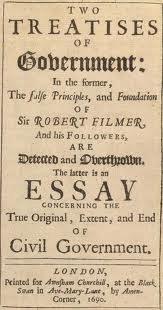Recommended edition: Locke, John. Two Treatises of Government. Edited by Peter Laslett. Melbourne: Cambridge University Press, 1988.
Excerpt:
Thou hast here the beginning and end of a discourse concerning government; what fate has otherwise disposed of the papers that should have filled up the middle, and were more than all the rest, it is not worth while to tell thee. These, which remain, I hope are sufficient to establish the throne of our great restorer, our present king William… and to justify to the world the people of England, whose love of their just and natural rights, with their resolution to preserve them, saved the nation when it was on the very brink of slavery and ruin…. If any one, really concerned for truth, undertake the confutation of my hypothesis, I promise him either to recant my mistake, upon fair conviction; or to answer his difficulties.
… In this last age a generation of men has sprung up amongst us, that would flatter princes with an opinion, that they have a divine right to absolute power, let the laws by which they are constituted and are to govern, and the conditions under which they enter upon their authority, be what they will; and their engagements to observe them ever so well ratified, by solemn oaths and promises. To make way for this doctrine, they have denied mankind a right to natural freedom; whereby they have not only, as much as in them lies, exposed all subjects to the utmost misery of tyranny and oppression, but have also unsettled the titles, and shaken the thrones of princes: (for they too, by these men’s system, except only one, are all born slaves, and by divine right are subjects to Adam’s right heir;) as if they had designed to make war upon all government, and subvert the very foundations of human society, to serve their present turn.
However we must believe them upon their own bare words, when they tell us, “We are all born slaves, and we must continue so;” there is no remedy for it; life and thraldom we entered into together, and can never be quit of the one, till we part with the other. Scripture or reason, I am sure, do not any where say so, notwithstanding the noise of divine right, as if divine authority had subjected us to the unlimited will of another. An admirable state of mankind, and that which they have not had wit enough to find out till this latter age!
Online:
Amazon
Internet Archive (Read Free Online)
Liberty Fund (Read Free Online)
